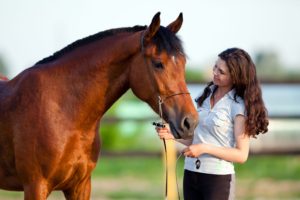One of the most important things to consider before buying a horse is the cost of keeping it. Sadly, horses aren’t the cheapest animals to keep, with many people forgetting about the costs that occur after the initial investments.
Whenever buying a horse, you must consider the costs of ongoing care and budget accordingly. Doing this before you buy a horse is a great idea as it ensures there are no surprises when it comes to cost of upkeep.
Here’s a rough breakdown of the expected expenses of owning and caring for a horse:
Shelter
There are two options when it comes to places to keep a horse – a field or stable. As you can imagine, not many horse owners have their own fields or livery to accommodate their horse, with most renting this out.
Costs for renting a livery can vary. For instance, a basic livery gives you a stable for the horse, but you must take care of the upkeep and maintenance yourself, with average costs being around £80-£100 per month.
You can also hire a livery where staff take care of your horse and stable for you. While much more convienent these are very expensive, costing upwards of £400 per month. You can opt to build your own livery but would need an appropriate space outdoors.
Renting a field is a much cheaper option, with some farmers renting out field space for as little as £50 per month. There isn’t more included for this price however, and you need to maintain the field and remove all muck.
Hay and Shavings
Horses need hay for bedding and feeding when living in a stable, while it’s often required for fields during the winter as the grass becomes less widespread.
The bigger the horse, the more hay is needed, with average hay costs hitting around £10-£30 per week for those living in stables. Field horses won’t need as much as this, with most hay only required during the winter months.
Additional Feed
Some horses need more food than others, so you may need to buy additional feed to cover their larger appetite. Ponies and smaller breeds that take part in less activities should be okay, but larger breeds ding plenty of exercise will likely need additional feed, probably adding a further £10-£20 on top of the initial cost of hay.
Medical Care and Coverage
A horse needs several shots each year to protect from ailments such as influenza and tetanus. You’ll need a vet to come out and administer these shots annually, with a cost of around £60-£100 to be expected.
You’ll also need to vet insurance for any unexpected problems that arise. Insurance is always recommended, as the monthly cost of around £50 is far less than having to pay hundreds or even thousands in vet fees.
Horses require regular dental check-ups too, so make sure they are seen to at least once a year. If there’s an issue with their teeth, several visits will be required, with an average dental call-out costing roughly £50-£80.




